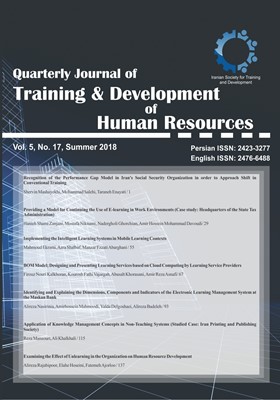-
-
List of Articles
-
Open Access Article
1 - Formulating the Pattern of Individual Development Plan for Human Resource Managers in Banking Industry
Arian Gholipour abolhassan faghihi MOHAMMAD ALI SHAHHOSSEINI baharak sefidgaran -
Open Access Article
2 - Studying the Challenges of Faculty Development Programs at Shahid Beheshti University
Bahar Bandali Mahmood Abolghasemi MohammadHassan Pardakhtchi Morteza Rezaeizadeh -
Open Access Article
3 - Designing the Competency Model of Public Relations Managers (Case study: National Iranian Gas Company and its Subsidiaries)
Hamidreza Arasteh Akbar Hassanpoor Ahmad Izady Tahmoores Bostani Amlashi -
Open Access Article
4 - The Study of Effective Development Factors on Establishment of Organizational Quality Management System in Universities (with Emphasizing the Development of Human Resources)
azam molamohamadi koroush fathi vajargah maghsood farasatkhah -
Open Access Article
5 - The Mediator Role of Managers' Trustworthiness in the Relationship between Transformational Leadership Style and Justice Perception of Employees (Case study: Mashhad Electric Energy Distribution Company; MEEDC)
Mohamad Reza Raecy Sepide Eskandari -
Open Access Article
6 - Studying Challenges of Knowledge Management Maturity with a Strategy-based Approach (Case Study: of Khuzestan Regional Electric Company)
Mehdi Mohammadi hadi zamani jafar torkzadeh Ghasem Salimi -
Open Access Article
7 - Analyzing and Prioritizing Effective Elements in Developing Innovative and Entrepreneurial Skills at In-service Training Systems; Case study of the National Organisation For Civil Registration
alimohammad Razeghi
-
The rights to this website are owned by the Raimag Press Management System.
Copyright © 2017-2026







